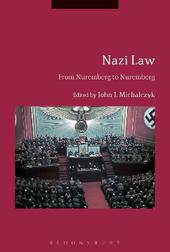
|
Nazi Law: From Nuremberg to Nuremberg
Hardback
Main Details
| Title |
Nazi Law: From Nuremberg to Nuremberg
|
| Authors and Contributors |
Edited by Professor John J. Michalczyk
|
| Physical Properties |
| Format:Hardback | | Pages:368 | | Dimensions(mm): Height 234,Width 156 |
|
| Category/Genre | The Holocaust |
|---|
| ISBN/Barcode |
9781350007239
|
| Classifications | Dewey:349.43 |
|---|
| Audience | | Tertiary Education (US: College) | |
|---|
| Illustrations |
19 b/w illustrations
|
|
Publishing Details |
| Publisher |
Bloomsbury Publishing PLC
|
| Imprint |
Bloomsbury Academic
|
| Publication Date |
28 December 2017 |
| Publication Country |
United Kingdom
|
Description
A distinguished group of scholars from Germany, Israel and right across the United States are brought together in Nazi Law to investigate the ways in which Hitler and the Nazis used the law as a weapon, mainly against the Jews, to establish and progress their master plan for German society. The book looks at how, after assuming power in 1933, the Nazi Party manipulated the legal system and the constitution in its crusade against Communists, Jews, homosexuals, as well as Jehovah's Witnesses and other religious and racial minorities, resulting in World War II and the Holocaust. It then goes on to analyse how the law was subsequently used by the opponents of Nazism in the wake of World War Two to punish them in the war crime trials at Nuremberg. This is a valuable edited collection of interest to all scholars and students interested in Nazi Germany and the Holocaust.
Author Biography
John J. Michalczyk is Professor and Director of Film Studies at Boston College, USA. He is the author of Filming the End of the Holocaust (Bloomsbury, 2014). He is also the editor of Medicine, Ethics, and the Third Reich: Historical and Contemporary Issues (1994), Resisters, Rescuers, and Refugees: Historical and Ethical Issues (1997) and, with SJ Raymond G. Helmick, Through a Lens Darkly: Films of Genocide and Ethnic Cleansing (2013).
ReviewsThis fine collection of essays explores how law came to serve as a tool of destruction in the Third Reich and as a means of moral reconstruction in the postwar years. It offers a timely and valuable intervention in ongoing debates about the capacity of law to deform and reform societies. * Lawrence Douglas, James J. Grosfeld Professor of Law, Jurisprudence & Social Thought, Amherst College, USA * From a wide variety of perspectives, the contributors to this book underline the supreme importance of the rule of justice and the horrifying consequences of its neglect. Well-written and thought-provoking. * D.W. de Mildt, editor of Justiz und NS-Verbrechen / Nazi Crimes on Trial, University of Amsterdam, The Netherlands *
|